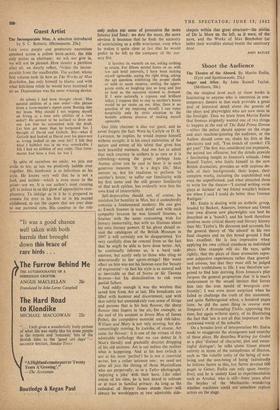Guest Artist
The Incomparable Max. A selection introduced by S. C. Roberts. (Heinemann, 25s.) LIKE sOnie purple and premature encomium splashed across a yellow book-jacket, the title only makes us obstinate: we wili not give in, we will not be pleased. How slender a partition after all, we dourly reflect, eivides the incom- parable from the insufferable. The author, whose first volume took its bow as The Works of Max Beerbohm, has only himself to blame, and, with what felicitous relish he would have hastened to do so. Deprecation was his most winning device.
At school 1 had been thought clever. Has natural abilities of a rare order'—this phrase from a form-master's report came floating into my brain. Why should I not impress myself on Irving as a man with abilities of a rare order? He seemed to be inclined to draw me out. Let him be astonished with the draft. Let him get more than he bargained for. I thought of David and Goliath But—what if Goliath had looked at David over his pince-nez as Irving looked at me over his? I felt that what 1 babbled was in no way remarkable. I felt I had no abilities of any order. That form- master had been a fool. So was I.
In spite of ourselves we smile; we join our smile to his; at last we positively bubble over together. His bonhomie is as infectious as his style. He knows very well that he is not a fool, and neither—which is even more to the point—are we. It is our author's most cunning gift to induce in us this glow of appreciative com- placency. To indulge us in it he is prepared to remain for ever in his first or in his second childhood, to cut the capers that are ever dear to our parental eyes. His candour in the role only makes our sense of possession the more fatuous and fond: we dote the more, the more obvious it becomes that he finds the necessity of entertaining us a trifle wearisome, even when he makes it quite clear at last that he would prefer to be left to the company of the nur- sery fire.
It lavishes its warmth on me, asking nothing in return. For fifteen mortal hours or so, with few and brief intervals, I have been making myself agreeable, saying the right thing, asking the apt question, exhibiting the proper shade of mild or acute surprise, smiling the appro- priate smile or laughing just so long and just so loud as the occasion seemed to demand. If I were naturally a copious and brilliant talker, I suppose that to stay in another's house would be no strain on me. Alas, there is no question of my imposing myself. I can repay hospitality only by strict attention to the humble arduous process of making myself agreeable.
Our little charmer is also our guest, and he never forgets the fact. Were he Carlyle or D. H. Lawrence, he implies, he would impose himself without scruple; it is his exact estimation of the nature and extent of his talent that gives him such beautiful manners. And one has to admit that such courtesy in authors is as rare as it is refreshing—among the great, perhaps Jane Austen alone can be said to have it in such generous measure. 'It is a dog's life,' Max assures us, but his readiness to perform 'in another's house,' to suffer our familiarity with his first name and the still greater familiarity of that arch epithet, has evidently won him his own kind of immortality.
Self-deprecation should not, of course, be mistaken for humility in Max, but it undoubtedly conceals a fundamental modesty. He can give u; Enoch Soames in such detail and with such sympathy because he was himself Soames, a Soames with the same consuming wish for literary immortality, but with no illusions about his own literary powers. If his ghost should re- visit the catalogues of the British Museum in 1997 it will certainly not be disappointed. Yet very carefully does he conceal from us the fact that he might be able to have done better. Art, he continually informs us, is a hard task- mistress, but surely only to those who cling so determinedly to her apron-strings? Her worst effect on him was not his famous care for 'beauty of expression'—in fact his style is as natural and as inevitable as that of Svevo or Sir Thomas Browne—but his disinclination to risk even partial failure.
And oddly enough it was the wireless that saved him from Art at last. His broadcasts are filled with humour and discernment, and with that subtly but unmistakably rum sense of things and persons that is his best flavour, the sharp flavour that lingers in the air, for example, at the end of his account in Seven Men of James Pethel, the compulsive motorist and risk-taker. William and Mary is not only moving, but dis- concertingly moving. In Zuleika, of course, Art ruins the flavour: it is one of the virtues of this admirable anthology that we can detect in it Max's blandly and gradually discreet dropping of his old mistress. Art is out before she realises what is happening. And at his best (which is not at his most 'perfect') he is not a convivial writer, but a rather intimate one: we need not after all join the throng of those Maximilians who are perpetually, as in a Taller photograph, 'enjoying a joke' with their hero. Like other voices of his time, he is best heard in solitude or at least in familial privacy. As long as the cathedral of Henry James stands there will always be worshippers at two admirable side- chapels within that great structure—the stories of De la Mare on the left, as it were, of the nave, and the Works of Max Beerbohm (as befits their worldlier status) beside the sanctuary door.
JOHN BAYLEY


































 Previous page
Previous page